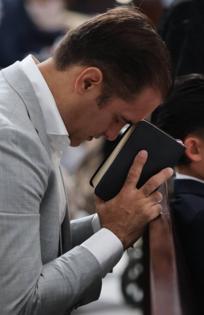A federal judge won't block ICE from entering Jewish and Christian congregations. How is that different from an earlier ruling?
Published in Religious News
PHILADELPHIA — A federal judge denied Friday a request by 27 organizations representing Christian and Jewish denominations to block a policy from President Donald Trump’s administration that allows for immigration enforcement agents to enter houses of worship without a warrant.
The ruling comes less than two months after a different federal judge blocked U.S. Immigration and Customs Enforcement agents from entering the facilities of Baptist, Quakers and Sikh congregations in response to another lawsuit.
The suits came in response to a change to longstanding policy as part of the administration’s crackdown on undocumented immigrants, in which the Department of Homeland Security rescinded a directive that limited federal agents’ ability to conduct immigration enforcement actions in sensitive locations such as churches, schools, and hospitals.
Here is what you need to know about the rulings — and how they impact houses of worship.
What did the denominations sue over?
In February, 27 Jewish and Christian denominations, the Philadelphia-based Quaker association Friends General Conference, filed a complaint saying that making houses of worship fair game for immigration enforcement raids violates the denominations’ religious right.
“An immigration enforcement action during worship services, ministry work, or other congregational activities would be devastating to their religious practice,” the complaint said. “It would shatter the consecrated space of sanctuary, thwart communal worship, and undermine the social service outreach that is central to religious expression and spiritual practice for Plaintiffs’ congregations and members.”
The lawsuit asked the judge to rescind the new “sensitive locations” policy, and prevent agents from entering houses of worship. It argued that without such action, some congregants would fear to attend services.
What did the judge rule Friday?
Dabney Friedrich, a federal judge in the District of Columbia who was appointed to the bench in 2017 by Trump, denied the denominations’ request.
The lawsuit failed to show a “credible threat,” Friedrich wrote, because the Trump administration did not “direct law enforcement to target churches or synagogues or to treat places of worship as high priority locations.”
Only one immigration enforcement action took place in a congregation associated with the denominations in the 10 weeks since the policy changed, the judge said. That indicates that houses of worship are not “singled out as special targets,” she wrote.
Friedrich also said the denominations failed to present “substantial evidence” that a decline in attendance, especially in Hispanic congregations, was directly the result of the change in policy toward houses of worship.
Blocking the policy, for example, wouldn’t reduce the risk of facing immigration agents while traveling to or from a religious service, the judge said.
“We are disappointed by this decision,” Rabbi Deborah Waxman, president and CEO of Reconstructing Judaism, said in a Friday statement.
How is the previous ruling different?
In January, Quaker groups filed a lawsuit in a Maryland federal court over the same policy change, making similar claims.
In February, Theodore Chuang, a federal judge in Maryland who was appointed by Barack Obama in 2013, blocked immigration agents from entering religious sites associated with the groups who sued.
The judge said in a memo explaining his decision that allowing for warrantless operations in places of worship “lacks meaningful limitations or safeguards.”
What is the Trump administration saying?
The U.S. Department of Homeland Security did not immediately respond to a request for comment after Friday’s ruling.
After the ruling out of Maryland late February, a DHS spokesperson said the goal of the policy was to protect “schools, places of worship, and Americans who attend by preventing criminal aliens and gang members from exploiting these locations and taking safe haven there because these criminals knew law enforcement couldn’t go inside under the previous Administration.”
Officers would use discretion and need approval from supervisors to enter a house of worship or school, the spokesperson said.
Earlier this month, DHS submitted a letter to Chuang informing him of their intent to file a motion to dismiss parts of the lawsuit. The department plans to argue that the change in policy is merely an internal document to provide guidance to agents.
What do the two rulings mean?
The latest ruling out of D.C. is straightforward: Nothing changes for the Jewish and Christian congregations represented in that lawsuit. The judge refused to block the Trump administration’s policy change, and the litigation will continue to advance without the court taking action.
Meanwhile, Quaker, Sikh, and Baptist congregations represented by the plaintiffs in the Maryland case have reprieve from the new policy. But the ruling is narrow, and applies only to those congregations affiliated with the lawsuit.
______
©2025 The Philadelphia Inquirer. Visit inquirer.com. Distributed by Tribune Content Agency, LLC.









Comments